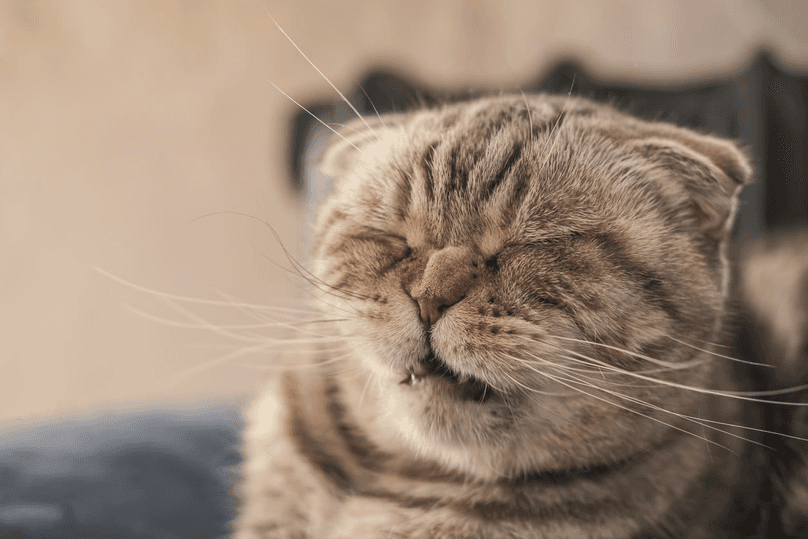
Uncover a few underlying causes, and learn when to seek help.
If your cat is like many others, they are known for hiding that they are sick. Cats, like humans, sneeze in response to an irritation in their nasal passages, such as a strong odor, dust, or an illness. Coughing, on the other hand, helps your cat get rid of irritants, foreign bodies, and mucus.
While an occasional sneeze isn’t cause for concern, if your cat is sneezing frequently, or exhibiting additional symptoms, it is likely you may need to schedule a visit to your vet. Coughing can also be caused by allergies, but it could also indicate a respiratory infection or hairball. If the sneezing and coughing continues for several days, or is severe, it may be time to plan a visit to your vet. As coughs and sneezes are hard to diagnose, it might be a good idea to capture a video of your cat when they experience an episode.
As coughing and sneezing are both quite common for cats, it’s worth it to dive into a few of the reasons and underlying causes below.
Common Causes of Coughing in Cats
Coughing is a protective reflex that helps your cat get rid of irritants, foreign particles, and mucus in its respiratory tract. If attentional symptoms like nasal discharge, labored breathing, tears, snoring, fever, lethargy, or decreased appetite occur, it is likely a symptom of a larger issue. There are a number of reasons why your cat may cough more frequently than usual. If you suspect something might be wrong, it may be one of the top causes listed below, but it is always best to consult your veterinarian.
Feline Respiratory Tract Infection
Respiratory tract infection, like the felineherpes virus (FHV) or the feline calicivirus (FCV), are common causes of coughing in cats, and are both very contagious among felines. Although infections are often treatable with antibiotics, your cat will need to be kept in a separate room where they can rest without infecting the rest of their feline family.
Feline Asthma
Asthma in cats is a chronic inflammation of the airways in the lungs — and is one of the most common causes of coughing in cats. Common triggers include cleaning products, grass, pollens, dust, and smoke. Although this cannot be completely cured, symptoms can often be alleviated with medication.
Inflammation and Liquid Build-Up
Any abnormal fluid build-up around a cat’s lungs that can result in coughing. If there is inflammation of the lung, as experienced in pneumonia, this can lead to a fluid build-up and coughing. Heart failure can also lead to a build-up of fluid in the lungs. In this case, your vet will take radiographs of your cat to determine the diagnosis.
Hairballs and Foreign Objects in the Throat
Cats can also cough from the presence of hairballs and foreign objects in the airway. If the cat appears to be retching, it is likely a hairball rising from the digestive tract. They may also have inhaled some liquid, an irritating gas, or other small particle. While a hairball doesn’t necessitate an emergency, an airway obstruction certainly does and you are safer consulting an expert.
Common Causes of Sneezing in Cats
If your cat is sneezing a lot, there many be a variety of causes depending on your cat’s symptoms. Changes in your home environment, like new litter, new cleaning products or freshener, or increased dust can easily encourage your cat to sneeze. Pay special attention to when and where your cat sneezes a lot, as this could be a good indicator of any environmental factors. While environmental factors create an impact, one of the main causes of sneezing remains respiratory infection.
If your cat is sneezing excessively, the underlying causes can be very similar to when they are coughing, and are best treated by scheduling a vet exam. Environmental factors, bacterial and viral respiratory infections, foreign materials, and dental disease are all leading causes. Most of the time, a cat’s sneeze will expel the irritating material. If you notice sneezing with underlying symptoms, it is likely something more is afoot.
When You Should Call Your Veterinarian
If your cat’s coughing and sneezing sneezing includes nasal discharge, heavy breathing, loss of appetite or fever, be sure to call your vet. Sneezing accompanied by other symptoms could be a sign your cat has an infection. If the coughing and sneezing keeps coming back, this may indicate asthma or allergies.
Your veterinarian will conduct an exam, run blood work, and use other diagnostic tools to make the best diagnosis. In most casts, treatments might include antibiotics, antiviral medications, fluid removal, oxygen therapy, surgery, or in some cases even cancer treatment. In these cases, it is always good to know you, and your wallet, are covered by the best cat insurance out there, so that your cat can receive the level of treatment and care they need.
It is always best to consult your vet before treating your cat’s cough or sneeze. Treatment without a diagnosis can worsen your cat’s condition, and ignoring patterns of coughing and sneezing will only harm them down the line. Since pre-existing conditions are not covered in many hcat coughing and sneezingealth insurance plans, we recommend you stay ahead of health issues by signing up for cat insurance while your kitten is still young.
With this informational guide, we hope you have better insight into your cat’s condition, and hope they are well on the way to a pawsitively smooth recovery.
For health-related issues, please consult with your pet’s veterinarian first.